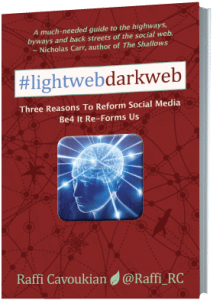Lightweb Darkweb: Raffi’s Book Raises the Online Alarm

With the rapid advancement of technology, many parents fear that if their children don’t become computer literate at a young age, they’ll be left behind. There’s also a huge convenience factor for parents. Many a modern mom has found herself standing in line with a cranky and restless toddler and handing over the smart phone to buy a few minutes’ peace. All those games and apps targeted at kids aren’t only entertaining, either. Many of them provide some sort of educational component, so your little one can work on their burgeoning math and literacy skills while you wait to renew your car insurance. With all of this technology our kids are growing up immersed in a digitally-connected world, in which we spend almost as much time (or maybe more) online as offline.
Raffi Raises Concerns About Kids Online
 Children’s entertainer Raffi Cavoukian – better known as just Raffi – argues that this isn’t all for the good. As we discovered in our podcast with him last year, Raffi is an advocate for children, and the founder of the Centre for Child Honouring. Now he’s turning his attention online in his new book Lightweb Darkweb. In the book, the singer explores the upsides and downsides of all this technology, and its impact on our children. In so doing, he makes the case for holding out on handing over that phone. At one point he writes, “Babies today will grow up in families that have a number of shiny tech screens. While we have no data indicating this is a good thing, we have many reasons for concern.”
Children’s entertainer Raffi Cavoukian – better known as just Raffi – argues that this isn’t all for the good. As we discovered in our podcast with him last year, Raffi is an advocate for children, and the founder of the Centre for Child Honouring. Now he’s turning his attention online in his new book Lightweb Darkweb. In the book, the singer explores the upsides and downsides of all this technology, and its impact on our children. In so doing, he makes the case for holding out on handing over that phone. At one point he writes, “Babies today will grow up in families that have a number of shiny tech screens. While we have no data indicating this is a good thing, we have many reasons for concern.”
According to Raffi, one of the biggest reasons for concern is the issues kids face around online safety. Following the suicide of Amanda Todd – an event that Raffi references in the book – the serious problem of online bullying became apparent to all of us. With the proliferation of social media, bullies can now follow children into their homes, attacking them online. There are also online predators to be concerned about. The social media companies themselves who are collecting user information seem benign by comparison, but the truth is that many parents don’t like the idea of their children’s demographic info being mined. As well, we don’t really know what the impact of all this screen time is on developing kids.
Intelligence and Sustainability
These questions around the impact of technology use lead to Raffi’s second reason for concern: intelligence. The point he’s making here is that by being constantly-connected, we may lose some valuable skills and miss some useful lessons. For instance, a kid who is constantly attached to a smart phone is spending less time making art, being active, interacting with others, engaging in imaginative play, or reading. All of these missed activities are beneficial for child development. As well, Raffi presents research that suggests that all of this constant stimulation early in life can reduce our long-term ability to pay attention.
The final reason for concern that Raffi raises is somewhat unexpected: sustainability. He discusses the environmental and social issues around all these tech devices we carry around. Most of us are familiar with the allegations that the overseas workers who assemble our computers, smart phones and tablets work long hours for low wages in less-than-ideal conditions. The issues don’t end there, however, as Raffi points out that the devices themselves aren’t exactly made from organically-grown kale. Some of the materials used in your phone may be toxic. On top of that, there are environmental issues about what happens to all these devices when they’ve outlived their usefulness. If we want to leave a better world for our children, we need to think about the impact of the devices we’re buying today.
Maximize the Lightweb, Minimize the Darkweb
Raffi argues that we need to work harder to protect our kids. He wants us to maximize the benefits of the online world, or the lightweb. He also wants us to minimize the downsides of the online world, or the darkweb. While I did find it somewhat ironic to be reading the book on my tablet (since an electronic copy was the easiest way to get the book to me), I found his case compelling. While Lightweb Darkweb is more about asking questions than providing answers, they are questions that need to be asked.
The truth is that few of us are going to be embarking on a tech fast, for ourselves or for our children. However, it may make sense for us to be a little more thoughtful about how much technology we use. Coming back to the question of how to help our kids become computer literate, Raffi argues for holding off. Let’s give him the last word:
“InfoTech is so easy that people master it at any age, without prior experience, let along childhood training. And as we know all too well, InfoTech and its devices are always changing. No need to start young.”
Lightweb Darkweb
Amber Strocel is a writer, aspiring math teacher, suburbanite, wife and mom of two. She believes in the power of the Internet to connect people, and she believes that numbers are the poetry of the universe. You can often find her knitting, sewing, volunteering, working in her garden, and sneaking chocolate when no one's looking. She blogs at Strocel.com and shares her photos on Instagram as @AmberStrocel.


















